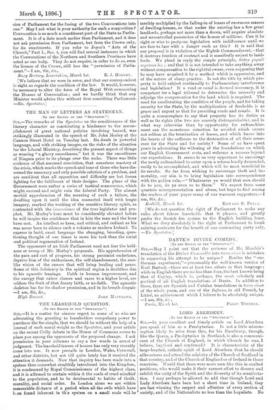THE MAN OF LETTERS AS STATESMAN. [To THE EDITOR OF
THE " SPECTATOR."1
la,—The remarks of the Spectator on the sensitiveness of the literary character as constituting a hindrance to the accom- plishment of great national policies involving hazard, was strikingly illustrated in the speech of Mr. John Morley at the -Cannon Street Hotel on Tuesday last. He dwelt in powerful language, and with striking images, on the risks of the situation for the Liberal Ministry, describing the present aspect of things as wearing "a glassy smoothness," but it was the smoothness of Niagara prior to its plunge over the rocks. There was little evidence of that assumed conviction, that conscious mastery of the crisis, which marks the speech and tone of those who have dis- cerned the necessary and only possible solution of a problem, and are confident that all opposition and difficulty are but forces fighting for the fulfilment of their designs. The plans of the Government were rather a series of tactical manceuvres, which might succeed and might ruin the Liberal Party. The almost morbid apprehension of the meaning of such a failure, the dwelling upon it until the idea connected itself with tragic imagery, marked the working of the sensitive literary spirit, as -contrasted with the insoaciance of the true legislator and pro- phet. Mr. Morley's tone must be considerably elevated before he will inspire the confidence that in him the man and the hour have met. An intellect so keen, and critical, and radiant as his was never born to silence such a volcano as modern Ireland. To express in lucid, exact language the changing, brooding, ques- tioning thought of oar times is more his task than the social and political regeneration of Ireland.
The opponents of an Irish Parliament need not fear the bold- ness or sweep of Mr. Morley's proposals. His apprehension of the pain and cost of progress, his strong pessimist undertone, deprive him of the enthusiasm, the self-abandonment, the seer- like vision of the causes that will bring healing and peace. Some of this deficiency in the spiritual region is doubtless due -to his agnostic leanings. Faith in human improvement, and the energy that raises classes and races to a higher level, are seldom the fruit of that dreary faith, or no-faith. The agnostic skeleton has for its shadow pessimism, and in its breath despair. —I am, Sir, Src.,


































 Previous page
Previous page